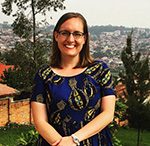Literacy

Student Testimonial
 Peace Corps Volunteer in Rwanda, I am always looking for ways to improve the English
skills of my students and fellow teachers. The Professors and Classes in the UofM
Literacy Program have given me tons of strategies to use and have helped me develop
ways to improve my school's Literacy instruction. It's been great working on the program
from my rural village across the world! ∼ Brooke Terry
Peace Corps Volunteer in Rwanda, I am always looking for ways to improve the English
skills of my students and fellow teachers. The Professors and Classes in the UofM
Literacy Program have given me tons of strategies to use and have helped me develop
ways to improve my school's Literacy instruction. It's been great working on the program
from my rural village across the world! ∼ Brooke TerryLiteracy Program
Literacy Education addresses the promotion of literacy, with specific emphasis on reading, writing, listening, and speaking. Urban literacy issues and research pertaining to children living at the poverty level are of particular interest to our literacy education faculty. The program of study is designed around the International Literacy Association (ILA)/National Council of Teachers of English (NCTE) standards that address what literacy professionals need to know and what they are able to do. These standards emphasize reflective professionals who have proficiency in three broad categories:
- knowledge and beliefs about literacy,
- instruction and assessment, and
- organizing and enhancing a literacy program.
No matter your career goals, local or global, we have a masters or doctoral program to meet your professional needs. Our online Master of Science program is ranked 8th in the top 20 online MS in Reading and Literacy programs in the country. Our literacy graduates:
- teach in major school districts,
- work in comprehensive universities or college-level literacy programs,
- serve as clinical supervisors, literacy coaches and literacy/language arts supervisors.
University of Memphis Center for Literacy Research and Practice
The mission of the University of Memphis Center for Literacy Research and Practice is to enrich the literacy practices of residents in the Mid-South with an emphasis on justice, equity, culture and social and emotional growth. The Center creates multi-age literacy events, in which UofM students encourage reading and writing within families, schools and communities. Visit the UofM CLRP website >.
The Department of Instruction and Curriculum Leadership is proud to offer an Online Masters of Science in Literacy and Language (formerly Reading). This program offers an in-depth theoretical and pedagogical understanding of literacy practices, assessment, and policies. By working closely with qualified faculty you can earn a degree that will enhance your ability to influence the profession of literacy and ultimately positively affect the lives of children.
The program prepares graduates for positions as:
- Literacy Coaches
- Lead Teachers
- Literacy Specialists
- Curriculum Coordinators
You may complete this degree online; no trips to campus are required. Our College of Education is accredited by NCATE (National Counsel of Accreditation in Teacher Education) and aligned with the International Literacy Association standards. The faculty from the online Masters in Literacy program has the desire and expertise to work with students with diverse experiences and specialties.
The online literacy program is flexible and convenient for classroom teachers or other full time professionals who have multiple responsibilities, yet are motivated to advance their education.
Degree Information
- Major: Instruction and Curriculum Leadership
- Concentration: Literacy (formerly Reading)
- Degree: MS
- Admission: See Admission page and MS Checklist
- Forms
- Major: Instruction and Curriculum Leadership
- Concentration: Literacy
- Degree: EdD
- Admission: See Admission page and EdD Checklist
- Forms
Program Requirements
Students who have not completed at least six semester hours of graduate level mode one course work in cultural, historical, or psychological foundations of education, must complete those hours during the first year of enrollment in the doctoral program. These prerequisites will not be counted toward the degree.
- A minimum total of 54 hours post masters hours.
- The major will consist of 42-45, with 9-12 hours of dissertation credit (ICL 9000) and 3-6 hours of doctoral seminar (ICL 8995).
- The research requirement will consist of courses directed toward research and/or statistical techniques and procedures necessary for the discipline and the dissertation topic.
- Approved transfer credit or post-master's courses may be accepted for not more than 12 semester hours.
- Completion of the college and university residency requirements. Additional information pertaining to the major and concentration areas may be secured from the Chair or Graduate Coordinator of the Department of Instruction and Curriculum Leadership.
Residency
Students working toward the doctoral degree must fulfill the University and College residency requirements after filing a program of studies.
Purpose
The purpose of residency is to provide the doctoral student with significant time for sustained contact with faculty members. An expected outcome is the acquisition of skills of inquiry, and opportunity for research, and the incorporation of professional values in to the experience that the student brings to graduate school. Also, it facilitates the creation of a cohesive climate in which inquiry becomes the linking feature of the graduate student experience. In short, residency is expected to be a vehicle for socialization into the shared community of professional life. At the heart of the community lies a commitment to sustained inquiry that extends beyond the period of doctoral preparation and into the students lifetime work, either as a practitioner or as one who demonstrates leadership based on a foundation of inquiry.
Doctoral Residency Policies
A doctoral student must select one of the following course enrollment options:
- The student will maintain two semesters of continuous enrollment of 9 hours per semester. The enrollment requirement may be satisfied by enrolling in fall, spring, and summer semesters.
- Three semesters of continuous enrollment per semester during two consecutive summers and at least 3 hours per semester during the intervening fall and spring semesters.
- Nine hours of enrollment per semester during two consecutive summers and at least 3 hours per semester during intervening fall and spring semesters.
A plan of residency will be developed by the student and major professor. The plan will be developed by the student and major professor. The plan will be reviewed by the department. The plan of residency consists of the following elements:
- The plan will be contained in a 3-5 page document.
- It will contain an introduction to the problem area that the student will address during the coming period of residency. This introduction will include a specification of the problem, an indication of its importance, and a brief summary of pertinent literature placing the problem in its context. Relevant theoretical implications will be noted.
- It will detail a plan of action including projected time benchmarks to resolve the problem. It is expected that this plan will allow for a sustained and multifaceted inquiry that incorporates significant components derived from the literature and have implications for the filed of study.
- Tools of inquiry expected to be required in the course of completing the residency will be noted. If the candidate possesses these tools, some indication documenting the mastery of the tool component should be noted. If skills of inquiry are to be acquired during the course of the residency this must be noted.
- Faculty resources associated with each component of the plan must be indicated. It is expected that the student will be in contact with individuals who have been engaged in this area beyond the campus.
- The products of the residency will be noted. It is expected that the residency will lead to a paper submitted to a refereed journal or presented at a peer reviewed conference.
Timetable for Filing for Residency
Prior to beginning residency, the written plan must be filed. The plan must have the approval signatures of the chair of the candidate's program advisory committee and of the department chair. It must be submitted to the department office of the candidate's major for approval no later than the last day of graduate registration in the semester designated to count as residency. Students are expected to have satisfied requirements for admission to the doctoral program before filing a residency plan.
The University of Memphis Student Chapter of the Literacy Association of Tennessee is a non-profit organization created for the purpose of improving literacy in schools and communities in and around Memphis. We seek to improve the literacy of all students in the city of Memphis and its surrounding communities and assist teachers in learning more effective ways of improving student literacy in all subjects.
Links
Questions?
For more information about the organization or to join, email us.
- Dr. Alycia Taylor, Faculty Co-Advisor
- Dr. Helen Perkins, Faculty Co-Advisor
- Clifford Clayton, UofM SCLA Student President
Our faculty are influential in setting the national agenda of improving the success of children living in poverty through research, school and district-wide interventions, serving on NGO’s boards, consulting, and authoring textbooks for pre-service and in-service teachers. The faculty are engaged in improving instruction in urban schools through projects like the award-winning Memphis Literacy Academy and the federally-funded Memphis Striving Readers Project, as well as working with other school districts across the nation. Seminal books are authored by our faculty, such as Technology to Teach Literacy: A Resource for K-8 Teachers, Literacy in Times of Crisis, Handbook of Research on Digital Tools for Writing Instruction in K-12 Settings and Content Literacy Strategies for Improving Student Achievement. The Literacy faculty is widely published in a variety of scholarly journals such as: Curriculum Inquiry, Journal of Adolescent and Adult Literacy, Journal of Latinos in Education, Journal of Literacy Research and The Reading Teacher.
Meet Our Faculty
- Laurie MacGillivray, Professor, Literacy Coordinator
lmcgllvr@memphis.edu - J. Helen Perkins, Professor
jhperkns@memphis.edu - Alycia Taylor. Clinical Instructor of Literacy
mtylor62@memphis.edu


